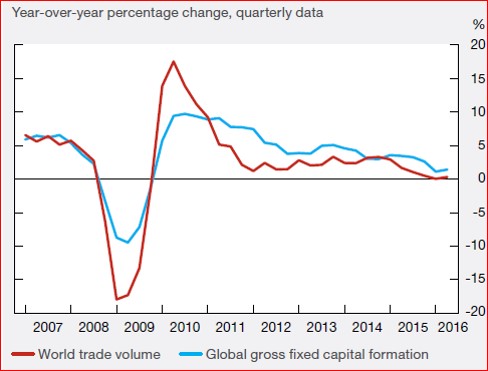The Bank of Canada (BoC) released its October Monetary Policy Report (MPR) [1] in which it revealed that Canadian exporters continue to meet with resistance in world markets. This shortcoming continues to hold back overall growth in the near term, a condition that frustrates the efforts of the BoC in stimulating economic expansion. The BoC freely states that the “ profile for growth in Canada is now lower than projected in its July’s MPR”. For sometime, the BoC has pinned its hopes on exports expanding , especially in the second half of 2016, to make up for “ lost ground during the first half of 2016”.As a consequence, the BoC has downgraded its forecasts for exports for 2017 and 2018. This downgrade has become an all too familiar pattern and deserves some special attention.
To begin with, global trade has greatly decelerated over the past five years as globalization seems to be running out of steam (Chart 1). Moreover, there arepolitical pressures in the wealthy countries to reverse the pattern of globalization, thus putting additional pressure on exporting nations such as Canada.
Chart 1 Global Trade and Investment, 2007-16

Source: Bank of Canada, MPR, October,2016
Going hand-in-hand with a slowdown in trade has been a sluggish rate of business investment which has been occurring since 2011. The United States has not experienced any meaningful growth in capital investment in the past five years; this has been reflected in the slowdown of U.S. imports. The trajectory of future U.S. investment continues to be underwhelming and does not bode well for Canadian exports.
One of the important issues facing Canadian exporters is their competitive cost position. While the exchange rate has contributed mightly to lowering costs, other competitors, such as Mexico, have experienced similar (if not greater) currency devaluations, thus nullifying any Canadian currency advantage. Consequently, Canada`s share of the U.S. non-energy imports has stagnated over the past decade relative to other countries (Chart 2). It will take more than just a further relative fall in the loonie to capture a greater share of the U.S. market.












Leave A Comment